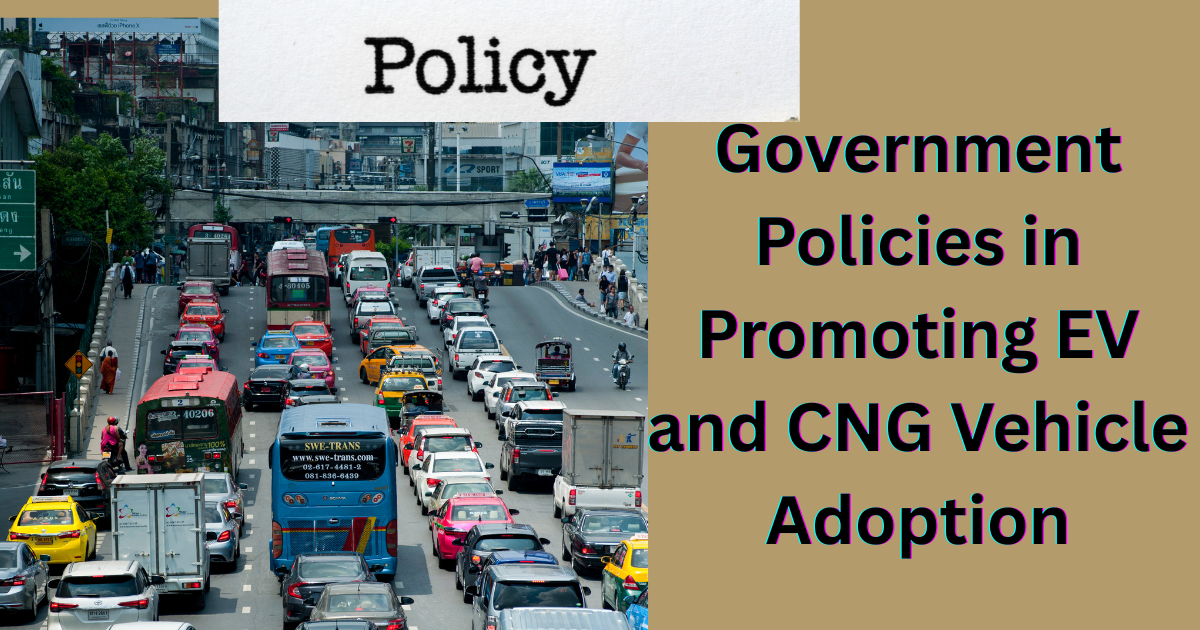The Role of Government Policies in Promoting EV and CNG Vehicle Adoption: Government policies play a pivotal role in accelerating the transition from traditional internal combustion engine vehicles to electric mobility. The various policy instruments employed by governments worldwide to promote EV adoption.
The Role of Government Policies in Promoting EV and CNG Vehicle
Excessive carbon emission is one of the major reasons. Poor air quality impacts the respiratory system along with many other side effects. Now the Indian government takes many initiatives to protect planet Earth and make it inhabitable. The main reason for promoting electric vehicles is to get a green environment.

India has made significant strides toward promoting eco-friendly alternatives in the transportation sector. Compressed natural gas (CNG) has become a prominent choice for vehicle owners due to its environmental benefits and cost-effectiveness.
Favorable Government Policies for CNG Vehicles
The Indian government has been proactive in promoting cleaner fuels, including CNG, under its broader environmental initiatives. A major component of this effort is the National Auto Fuel Policy, which outlines a framework for reducing vehicular emissions. The Automotive Fuel Policy also focuses on promoting cleaner fuels and improving vehicle standards.
Government Policies for Electric Vehicles
Government policies play an important role in promoting the adoption of electric vehicles in India; various initiatives and schemes have been implemented to accelerate the transition to electric mobility. Electric vehicles offer a path towards energy independence. Since they rely on electricity for power, electric vehicles can significantly reduce India’s dependence on imported oil. This not only strengthens the nation’s energy security but also presents a significant economic advantage.
Government policies that have impacted the EV market
1. Fuel economy and Emissions standards
This is set by governments to limit the amount of pollutants that vehicles can emit and promote the use of fuel-efficient technologies. These standards typically set minimum requirements for the miles per gallon a vehicle must achieve and limit the amount of pollutants that can be emitted.
2. Tax Credits and Rebates
In India, the government has implemented a variety of tax credits and rebates to encourage the adoption of electric vehicles.
- FAME in India Scheme: The Faster Adoption and Manufacturing of Electric Vehicles in India scheme was launched in 2015 to promote the adoption of electric and hybrid vehicles.
- Goods and Services Tax (GST) Reduction: In 2019, the Indian government announced a reduction in the GST rate on electric vehicles from 12% to 5%.
- Income Tax Benefits: In the 2019 Union Budget, the Indian government announced that electric vehicle buyers would be eligible for an income tax deduction of up to INR 1.5 lakh on the interest paid on loans taken to purchase electric vehicles.
- State-level incentives: Several Indian states have also implemented their incentives to encourage the use of electric vehicles. For example, the Delhi government exempts electric vehicles from paying road tax
The Role of Government policies in Promoting Electric Vehicle Adoption
- Policy instruments driving EV Adoption
Purchase Incentives: Many countries offer financial incentives, such as tax credits or rebates, to reduce the upfront cost of electric vehicles. Charging Infrastructure Investments: Governments are investing in EV charging infrastructure to alleviate range anxiety.
- Emission Regulations:
It is stringent emission reduction targets that compel automakers to produce cleaner vehicles, accelerating the shift to electric propulsion technologies.
- Current Developments:
European Union Regulation: The EU aims to reduce greenhouse gas emissions by 55% by 2030. Stricter emissions standards and a robust charging infrastructure are central to achieving this goal.
- Challenges and considerations:
Insufficient charging infrastructure can impede EV adoption. Governments must prioritize the development of a widespread and convenient charging network.
- Future Possibilities:
Government could incentivize the electrification of public transportation fleets and commercial vehicles, which could significantly reduce emissions. This is International collaboration on EV policies could standardize regulations, enhance technology sharing,
Conclusion
In this article we discuss The Role of Government Policies in Promoting EV and CNG Vehicle Adoption: This is set by governments to limit the amount of pollutants that vehicles can emit and promote the use of fuel-efficient technologies. And through a combination of incentives, regulations, and strategic investments, governments can catalyze electric vehicle adoption Electric vehicles offer a path towards energy independence. Since they rely on electricity for power, electric vehicles can significantly reduce India’s dependence on imported oil.
